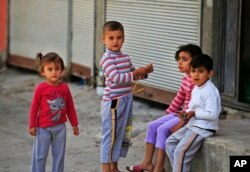Unaccompanied minors fleeing places of conflict face rape, detention, beatings, forced labor and even death, according to the U.N. Children's Fund.
A UNICEF report, Danger Every Step of the Way, says more than 7,000 children reportedly took the central Mediterranean route from North Africa to Italy from January to June 2016, more than double the number during the same period in 2015.
It also highlights the Mediterranean route as one of many risks.
“If you run, they shoot you and you die. If you stop working, they beat you,” Aimamo, 16, told UNICEF officials about the farm in Libya where he and his twin brother had to work in order to pay smugglers. The brothers traveled from Gambia through Senegal, Mali, Burkina Faso and Niger.
Italian social workers said boys and girls suffer sexual violence.
“Some of the girls were pregnant when they arrived in Italy, having been raped,” the report says.
Many statistics on refugee deaths, disappearances and detentions aren't known, but the report, citing numbers from the International Organization for Migration, said that of 7,567 children crossing the Mediterranean this year, 92 percent were unaccompanied.
From January 1 to June 5, 2016, 2,809 deaths were recorded in the Mediterranean, the IOM said. For all of 2015, this number was 3,770, it said, and many of them were children.
Youths' stories
The UNICEF report includes stories such as that of Peace, a 17-year-old girl from Nigeria who became orphaned in 2012. She was living with her impoverished aunt, who decided to marry her to a 40-year-old man.
“This man took me to his house and made me his house girl. I said to my aunt, ‘He’s older than my dad,’ but she said, ‘If you don’t marry this man, I will poison you,’ ” Peace said.
The adolescent decided to escape. Smugglers took Peace, who traveled unaccompanied, across the Sahara to Libya. She told of seeing dead bodies as she crossed the desert. In Sabratha, Libya, she was detained in a windowless house for weeks. She heard shooting and people fighting.
“Our Libyan handlers wouldn’t let us out," Peace said. "There was no water, no change of clothes, not enough food.”
Peace was eventually able to get to a boat to Italy. During the journey, she said, some people fell overboard and drowned. Others fainted and died.
“I wish my friend had told me how difficult this is. I would have continued suffering in Nigeria,” she said.
Peace is waiting for an asylum hearing in Italy.
In 2015, almost 96,000 unaccompanied minors applied for asylum in Europe, out of the 406,000 children in a total of 1.4 million applications, the UNICEF report says.
Protecting children
UNICEF has urged the European Union to craft legislation to create a stronger process through which minors can find safety, and it also advocates for the reunion of children with family members.
Marie-Pierre Poirier, UNICEF’s special coordinator for the refugee and migrant crisis in Europe, said people should never forget that children bear no responsibility for their plight and have every right to a better life.
“Children on the move have endured war, persecution, deprivation and terrible journeys," Poirier said. "Even when they have reached the relative safety of their destination, they still need protection, education, health care and counseling. We must be by their side.”
UNICEF also calls for countries to confront the refugee crisis and find solutions to a "never-ending movement of children in search of a better life."
"Children’s lives are put on hold for what to them would seem like an eternity, their aspiration to learn, their hopes for the future frozen in limbo,” Poirier said.





